Walk the Line - Movie Review
 Walk the Line 2005
Walk the Line 2005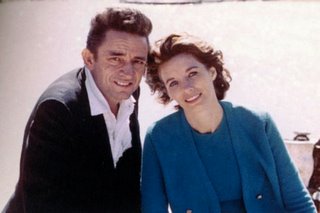 There’s good news and bad news about the latest big budget biopic to hit the multi-screens. We’ll start with the good: Johnny Cash and June Carter Cash as the subject matter and Joaquin Phoenix and Reese Witherspoon as their interpreters. Plaudits and kudos all around! We have been long time fans of the Cashes, hell’s bells, the Carters too! And while we may have had our ups and downs with Joaquin and Reese over the years, we are here to tell you that they deliver the goods in two of the most complete and powerful performances of the year. And the bad? Well, we hesitate to label it . . . ‘cause that’s just not our style, but we cast a jaundiced eye at director James Mangold and co-screenwriter Gill Dennis. Tsk, tsk. It is not to say that they run completely afoul, it is merely to point out that what could have been has been done better . . . and obviously worse. The only reasons we are removing our belts and asking them to step outside for a good lashing, is that we had our hopes up too high, and in the clinch, the true moments throughout the film where we wanted to be dazzled, they let us down.
There’s good news and bad news about the latest big budget biopic to hit the multi-screens. We’ll start with the good: Johnny Cash and June Carter Cash as the subject matter and Joaquin Phoenix and Reese Witherspoon as their interpreters. Plaudits and kudos all around! We have been long time fans of the Cashes, hell’s bells, the Carters too! And while we may have had our ups and downs with Joaquin and Reese over the years, we are here to tell you that they deliver the goods in two of the most complete and powerful performances of the year. And the bad? Well, we hesitate to label it . . . ‘cause that’s just not our style, but we cast a jaundiced eye at director James Mangold and co-screenwriter Gill Dennis. Tsk, tsk. It is not to say that they run completely afoul, it is merely to point out that what could have been has been done better . . . and obviously worse. The only reasons we are removing our belts and asking them to step outside for a good lashing, is that we had our hopes up too high, and in the clinch, the true moments throughout the film where we wanted to be dazzled, they let us down.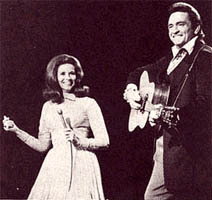 Charting the true story of any legend can be haphazard at best, or overblown, or just plain maudlin . . . and with the dual chore of attempting to parlay the great love story of musical legends Johnny Cash and June Carter Cash, the filmmakers bite off a bit more than they can chew. Ever since the movies began, we have been sitting back in our seats and viewing biopics of the great men and women in history. From the biography craze in the 1930’s that brought us “The Story of Louis Pasteur”, “The Life of Emile Zola”, “The Great Ziegfeld”, “Juarez”, “Marie Antoinette” and countless others to the musical biographies that range from brilliant: “Coal Miner’s Daughter”, to fine “Bound for Glory” to fair: “Sweet Dreams” and last year’s “Ray”. The difficulty in realizing a life on film should be fairly self evident. How in the hell do you portray a life’s work in two hours? Well, you don’t. Either you focus on an important chapter in a famous life: (See our recent “Capote” review.) or you paint an awfully big canvas – see: “Lawrence of Arabia”, “Patton” or “Gandhi”. While the epic length drama may perfectly suit the world leaders and great men and women of our time, a musical biography is usually painted on a smaller scale. Sadly, by now we are used to the clichés of a celebrity life portrait. Humble beginnings, childhood trauma, the slow crawl to acceptance, the breakthrough success, the road to excess, the dangerous pitfalls along the road, and the final purification and deification of the legend. Cue the end music and hopefully not a dry eye in the house! The problems with “Walk the Line” is that it cannot manage to wrestle itself free of any of the clichés listed above. But when the two main performances are so beautifully drawn and the chemistry is palpable, the film manages to succeed in spite of itself.
Charting the true story of any legend can be haphazard at best, or overblown, or just plain maudlin . . . and with the dual chore of attempting to parlay the great love story of musical legends Johnny Cash and June Carter Cash, the filmmakers bite off a bit more than they can chew. Ever since the movies began, we have been sitting back in our seats and viewing biopics of the great men and women in history. From the biography craze in the 1930’s that brought us “The Story of Louis Pasteur”, “The Life of Emile Zola”, “The Great Ziegfeld”, “Juarez”, “Marie Antoinette” and countless others to the musical biographies that range from brilliant: “Coal Miner’s Daughter”, to fine “Bound for Glory” to fair: “Sweet Dreams” and last year’s “Ray”. The difficulty in realizing a life on film should be fairly self evident. How in the hell do you portray a life’s work in two hours? Well, you don’t. Either you focus on an important chapter in a famous life: (See our recent “Capote” review.) or you paint an awfully big canvas – see: “Lawrence of Arabia”, “Patton” or “Gandhi”. While the epic length drama may perfectly suit the world leaders and great men and women of our time, a musical biography is usually painted on a smaller scale. Sadly, by now we are used to the clichés of a celebrity life portrait. Humble beginnings, childhood trauma, the slow crawl to acceptance, the breakthrough success, the road to excess, the dangerous pitfalls along the road, and the final purification and deification of the legend. Cue the end music and hopefully not a dry eye in the house! The problems with “Walk the Line” is that it cannot manage to wrestle itself free of any of the clichés listed above. But when the two main performances are so beautifully drawn and the chemistry is palpable, the film manages to succeed in spite of itself.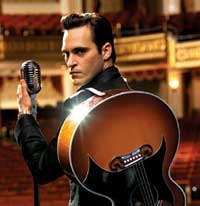 To many screengoers, Johnny Cash is the main draw with his famed “Man in Black” stage persona and litany of chart-toppers. And with his portrayal of the legend, Joaquin Phoenix banishes any doubt that he can deliver the goods as a leading man. He is simply amazing to watch. Obviously researching the hell out of the role, and practicing in front of his mirror at home, Joaquin lowers his vocal register and bravely attempts the singing chores along with the physical attributes that was the real Johnny Cash’s musical legacy. While anyone with a good ear could not be fooled into thinking that this is the real Johnny Cash singing, Joaquin manages to capture the style and delivery almost perfectly. To be able to sustain it for the many onstage musical scenes is nothing short of miraculous. All this would have meant nothing if Joaquin was not up to the dramatic and comedic moments in The Man in Black’s life. He is. Believe us, he is.
To many screengoers, Johnny Cash is the main draw with his famed “Man in Black” stage persona and litany of chart-toppers. And with his portrayal of the legend, Joaquin Phoenix banishes any doubt that he can deliver the goods as a leading man. He is simply amazing to watch. Obviously researching the hell out of the role, and practicing in front of his mirror at home, Joaquin lowers his vocal register and bravely attempts the singing chores along with the physical attributes that was the real Johnny Cash’s musical legacy. While anyone with a good ear could not be fooled into thinking that this is the real Johnny Cash singing, Joaquin manages to capture the style and delivery almost perfectly. To be able to sustain it for the many onstage musical scenes is nothing short of miraculous. All this would have meant nothing if Joaquin was not up to the dramatic and comedic moments in The Man in Black’s life. He is. Believe us, he is. June Carter, has unfortunately been slighted by some from her deserved co-position of legendary singer/songwriter, content as she was to bask in her husbands glory throughout the years. Tis a pity. ‘Cause the story of June Carter deserves its own Silver Screen tribute, but we will have to make due with the present. And in the personification of Reese Witherspoon, we are more than happy. Reese. Reese’s pieces. Reesala! We love you . . . again! We first became enamored of Reese with her film debut when she was a mere sprout of 14 in the coming of age drama “The Man in the Moon.” We were hooked. For those of you who might have missed it . . . go out and rent it, NOW!!! We’ll wait . . .
June Carter, has unfortunately been slighted by some from her deserved co-position of legendary singer/songwriter, content as she was to bask in her husbands glory throughout the years. Tis a pity. ‘Cause the story of June Carter deserves its own Silver Screen tribute, but we will have to make due with the present. And in the personification of Reese Witherspoon, we are more than happy. Reese. Reese’s pieces. Reesala! We love you . . . again! We first became enamored of Reese with her film debut when she was a mere sprout of 14 in the coming of age drama “The Man in the Moon.” We were hooked. For those of you who might have missed it . . . go out and rent it, NOW!!! We’ll wait . . .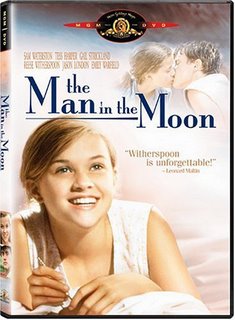 You’re done? Didn’t you just love it? We certainly did. Now, as with many youngsters, we weren’t quite sure that Reese was the real thing until we were delighted to sit back and watch her mature as an actress in a string of interesting roles. From her psychotic take on Little Red Riding Hood in “Freeway” to her emerging comic chops in “Pleasantville” thru her perfectly timed breakthrough role as Tracy Flick in the vastly underrated “Election.” Unfortunately, her critically praised comedic skills and petite prettyiness doomed her quickly to run of the mill fodder. She became the hope of the industry dying to discover the next bright young thing. And the downhill spiral began. But we can all relax. Reese has come home to us! Her performance as June Carter is nothing short of astonishing. Whether it’s a combination of her determination to play this role, or her respect for the great lady, Reese pulls out all the stops in creating a cinematic version of June that is a powerful mixture of honesty, class, and talent. And she sings the damn gummed songs herself!
You’re done? Didn’t you just love it? We certainly did. Now, as with many youngsters, we weren’t quite sure that Reese was the real thing until we were delighted to sit back and watch her mature as an actress in a string of interesting roles. From her psychotic take on Little Red Riding Hood in “Freeway” to her emerging comic chops in “Pleasantville” thru her perfectly timed breakthrough role as Tracy Flick in the vastly underrated “Election.” Unfortunately, her critically praised comedic skills and petite prettyiness doomed her quickly to run of the mill fodder. She became the hope of the industry dying to discover the next bright young thing. And the downhill spiral began. But we can all relax. Reese has come home to us! Her performance as June Carter is nothing short of astonishing. Whether it’s a combination of her determination to play this role, or her respect for the great lady, Reese pulls out all the stops in creating a cinematic version of June that is a powerful mixture of honesty, class, and talent. And she sings the damn gummed songs herself! The best we can say about our lackluster response to James Mangold’s direction is that it’s pretty much what we expected from the man who helmed “Girl, Interrupted” and “Kate & Leopold.” Take that as a back handed compliment, if you must. It’s how we meant it. We will go on record as stating that even in previous endeavors, we found Mr. Mangold quite capable of keeping a story moving along, just a skootch inept in the creative visualization or atmosphere departments. Sadly, the same goes for “Walk the Line.” We do applaud his extended use of close-ups and his tight focus on the onstage musical numbers - but with Joaquin and Reese he would have been an idiot not to exploit their onscreen chemistry visually. But ultimately it matters not, not when you have Joaquin and Reese in Oscar worthy form. If ever a film cried out to be seen on the strength of the performances alone, this is it. So go ahead, you tightwads, take a crowbar to that wallet and spend some sawbucks on “Walk the Line.” You’ll be glad we done sent you, y’all. And if you don't listen to us . . . well, we believe the real Johnny Cash said it best.
The best we can say about our lackluster response to James Mangold’s direction is that it’s pretty much what we expected from the man who helmed “Girl, Interrupted” and “Kate & Leopold.” Take that as a back handed compliment, if you must. It’s how we meant it. We will go on record as stating that even in previous endeavors, we found Mr. Mangold quite capable of keeping a story moving along, just a skootch inept in the creative visualization or atmosphere departments. Sadly, the same goes for “Walk the Line.” We do applaud his extended use of close-ups and his tight focus on the onstage musical numbers - but with Joaquin and Reese he would have been an idiot not to exploit their onscreen chemistry visually. But ultimately it matters not, not when you have Joaquin and Reese in Oscar worthy form. If ever a film cried out to be seen on the strength of the performances alone, this is it. So go ahead, you tightwads, take a crowbar to that wallet and spend some sawbucks on “Walk the Line.” You’ll be glad we done sent you, y’all. And if you don't listen to us . . . well, we believe the real Johnny Cash said it best.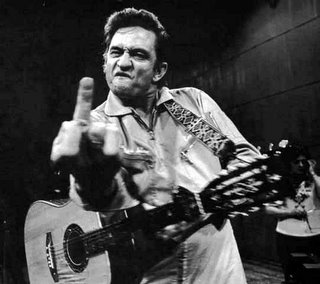 Directed by James Mangold
Directed by James MangoldWritten by Gill Dennis & James Mangold
Based on “The Man in Black” and “Cash: An Autobiography” by Johnny Cash
Starring
Joaquin Phoenix as Johnny Cash
Reese Witherspoon as June Carter
Ginnifer Goodwin as Vivian Cash
Robert Patrick as Ray Cash
Dallas Roberts as Sam Phillips
Shelby Lynne as Carrie Cash
Tyler Hilton as Elvis Presley
Waylon Malloy Payne as Jerry Lee Lewis
Shooter Jennings as Waylon Jennings
Sandra Ellis Lafferty as Maybelle Carter
Johnathan Rice as Roy Orbison
Ridge Canipe as Young J.R. Cash
Cinematography by Phedon Papamichael
Film Editing by Michael McCusker
Costume Design by Arianne Phillips
Original Music and Music Supervision by T-Bone Burnett
Production Design by David J. Bomba
Art Direction by John R. Jensen and Rob Simons
Set Decoration by Carla Curry


<< Home